Congratulations to CMS members Dr Chloe Lucas and Dr Phillipa McCormack on receiving 2025 ARC DECRA (Discovery Early Career Researcher Award)!
CMS also wants to recognise the academics that worked hard on good proposals that were unfortunately not successful – we know how much work and hope goes into these!
Dr Phillipa McCormack was awarded $482,990.
Project Summary: Preparing Australia for a fiery future: Five strategies to guide law reform. Australia does not have the necessary legal frameworks to proactively mitigate bushfire risks. This project aims to support effective, equitable, and timely fire mitigation through law reform. By pioneering holistic assessment of adaptation in state fire laws, and drawing novel insights from international case studies (Canada, Spain and USA) and active stakeholder input, expected outcomes include practical pathways for law reform and new international networks for exchanging knowledge. Outputs to guide more effective implementation of evidence-based legal reform are expected to assist policy makers to enact improved fire prevention, benefitting fire agencies, communities, and ecosystems to thrive in a future increasingly defined by fire.”
Dr Chloe Lucas was awarded $487,736.
Project Summary: Helping Citizens Share Responsibility for Democratic Climate Adaptation. This project will create new tools to help citizens participate in democratic dialogue about climate change adaptation. Climate change impacts the lives of Australians, including through more frequent and intense bushfires, floods, heatwaves, droughts and storms. However, most citizens are not given the opportunity to be involved in government decisions about how to plan for and manage these risks. This project explores games and play-based forms of group deliberation as ways to engage a wide range of citizens in setting agendas for climate adaptation policy and planning. It will identify diverse perspectives and priorities, and start place-based conversations between citizens and governments about how to thrive in a climate-changed world.
See all successful projects here: https://rms.arc.gov.au/RMS/Report/Download/Report/a3f6be6e-33f7-4fb5-98a6-7526aaa184cf/265
Powering Locally Led Inclusive Community Based Conservation, Research and
Sustainable Development Approaches Blue Pacific.
Speaker: Rachel Sapery-James (Senior Manager Blue Pacific, World Wide Fund for Nature (WWF))
Recording Date: 25th July 2024
The recording for this webinar is now available here.
Brief Abstract:
Rachel will delve into the transformative ambition of WWF’s Blue Pacific Programs, her leadership to
elevate traditional Indigenous knowledge and inclusive conservation practices. Prioritising local leadership, value systems, and the revitalization of customary governance, ensuring that both People and Nature thrive across the Pacific. The discussion highlights the urgent need to enhance cultural ompetency among staff and practitioners, raising awareness and advocating for the decolonization of erspectives and approaches. By empowering First Nations, local communities to lead and design conservation effort, be active leaders in design architecture of research and development programs, we foster a more collaborative approach and long-lasting solutions. Key themes include: Bridging Western science with traditional wisdom to bolster community climate resilience, Inclusive Ocean Science Academia Training, Community-based fisheries and marine ecosystems management in Melanesia (PNG, Solomon Islands and Fiji). Through policy engagement and respectful meaningful long-term partnerships, we will showcase three case studies demonstrating the successful implementation of these inclusive and community-led initiatives. A climate lens remains central to all our efforts, ensuring sustainability and climate resilience.
Girringun: Nguri - Indigenous rangers tell ancient stories of the Great Barrier Reef | WWF-Australia - https://www.youtube.com/watch?v=D2b_e5NOylw
WWF Pacific – WWF Solomon Islands – Western Province Seascape, Scaling Sustainable Sea-grapes - Community Based Management https://www.youtube.com/watch?v=MBqzHi4jDXE
WWF Pacific – WWF Solomon Islands - A Blueprint for a People and Nature Positive Pacific - https://www.youtube.com/watch?v=j_PZdve3nyI&t=27s
Sea Women Melanesia Papua New Guinea Sea Women of Melanesia 2021 Champion of the Earth - Inspiration and Action - https://www.youtube.com/watch?v=zHx0rrWZmI8&list=PLgo8ocnrcJsuFc-YEZS9-DeSrJpgVIPHH
Bio:
Rachel Sapery-James is a Marine Biologist specializing in Social Environmental Systems and addressing complex challenges affecting both communities and nature. Her work focuses on leveraging Nature Solutions and Indigenous Knowledge to tackle the Climate Crisis, thereby enhancing Community Resilience throughout the Blue Pacific. Rachel earned her MSc from Bremen University’s ZMT in Germany.
She also completed a postgraduate research diploma and post graduate research certificate in sea cucumber aquaculture hatchery and juvenile grow-out techniques at James Cook University. Additionally, Rachel holds a Bachelor of Science in Marine Biology and Aquaculture from James Cook University in
Townsville.
Congratulations to CMS member Dean Greeno, who was named a finalist in the country's most prestigious First Nations art award - the National Aboriginal & Torres Strait Islander Art Awards!
Dean's placing artwork, a paperbark, reed, plywood and driftwood sculptural piece called tunapri milaythina muka, which in English means to know sea country through making, is his view of his cultural heritage.
Inspired by the history of his family on Cape Barren Island, and his own time growing up there, Greeno, a truwulway pakana man, has "wrapped traditional canoe making inside of ship building and contemporary design" in a "physical and spiritual link to his ancestral past".
Read the article in The Examiner here: https://www.examiner.com.au/story/8717636/dean-greeno-named-finalist-in-countrys-most-prestigious-first-nations-art-award/
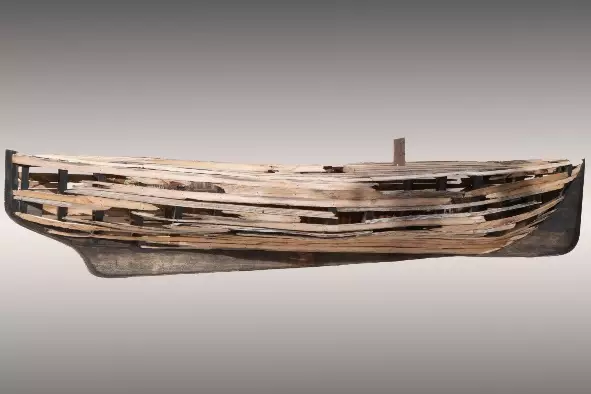
Dean Greeno's tunapri milaythina muka, To know Sea Country through making, a finalist in the National Aboriginal & Torres Strait Islander Art Awards. Picture source: The Examiner
CMS Director Prof Gretta Pecl recently sat down with CMS member Matt Testoni on the Seacreatures Podcast to talk about squid!
Listen here: Episode 51: Squid with Gretta Pecl
In this episode Matt chats to squid and climate scientist Gretta Pecl all about the amazing world of squid! From their bizarre and various mating behaviours to why their skin and ink is so cool. If you love squid facts this is the episode for you!
Check out Gretta's citizen science project REDMAP here:
https://www.redmap.org.au/
Gretta's squid articles here:
https://www.redmap.org.au/article/squid-the-biology-basics/
https://www.redmap.org.au/article/squid-mating-calamari-nuptials/
and Gretta's Youtube special all about these cephalopods here:
https://www.youtube.com/watch?v=PKqRAaxsykw
Visit the Seacreatures Instagram:
https://www.instagram.com/seacreatures_podcast/
Check out Matt Testoni's photography on Instagram
https://www.instagram.com/matt_testoni_photography/
or at
https://www.mtunderwatermedia.com
The recent workshop, co-hosted by CMS, convened a diverse group of experts, including teams from various CSIRO business units, alongside researchers from the University of Tasmania, Queensland University of Technology, the University of Queensland and others. The event aimed to address the evolving role of artificial intelligence in socio-ecological modelling and to prepare the community for the changes and opportunities that are on the horizon with the advancement of AI technologies.
Participants engaged in thought-provoking sessions and breakout discussions, focusing on the strengths and weaknesses of end-to-end AI modellers, and the degree of trust that should be placed in AI. These discussions also explored the skills required to effectively work with AI in the field, how to sustain existing expertise, and the potential for specialized AI to support human efforts. Looking forward, the workshop examined strategic pathways for AI in ecosystem modelling, the possibility of unique collaborations with technology leaders, and preparations for changes anticipated over the coming years.
The workshop's primary objective was to start the conversation around how to safely incorporate AI into scientific modelling workflows, and to produce a manuscript that will provide guidance for other socio-ecological modellers. This document aims to offer a clear direction for the community as it adapts to the increasing presence of AI in research and practice, ensuring that the field remains capable of adapting to the accelerating pace of technology advance.
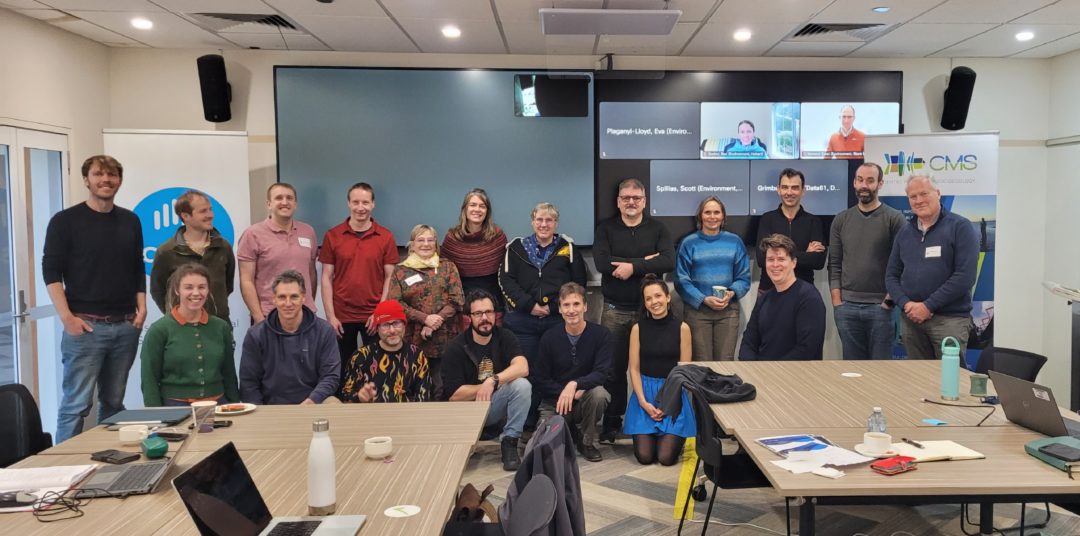
Image: Participants at the AI-Ecosystem Modelling Workshop in June 2024, co-hosted by CMS.
By Dr Danilo Urzedo (CSIRO)
Summary: Digital advancements are increasingly influencing knowledge production to suggest ways of enhancing the efficiency and precision of conservation practices and policies. From environmental big data to generative Artificial Intelligence (AI), a rising number of technological conservation developments are designed and deployed to inform decisions, mobilise participation, and automate labour-intensive tasks. By drawing on Global South perspectives of decoloniality, this talk will present formulations on environmental data justice and how data-driven AI tools shape the legitimacy of conservation expertise. While these conservation technologies seek to facilitate the accessibility and effectiveness of informed decisions, data-driven AI systems can also reinforce or exacerbate power asymmetries and critical injustices. This talk will emphasise the case of chatbot developments and their associated epistemic consequences for conservation decisions across varied contexts and sites.
Eight CMS members from Hobart attended the Marine Socio-Ecological Systems Symposium (MSEAS) in Yokohama, Japan, from June 5-7. The MSEAS meeting, which has been endorsed by the UN as a UN Ocean Decade event, was eagerly awaited, having been delayed from 2020 by COVID19. It more than lived up to the anticipation!
The tagline for MSEAS was ‘navigating global change in the marine environment’. It bought together contributions from 250+ of our research colleagues from 30+ countries, on topics such as the integrated assessment of multiple ocean uses across sectors, including fisheries, renewable energy, coastal development, oil and gas, transport, and the need for conservation and stewardship. Emphasis was on the methodological and empirical challenges involved in including the human dimensions in integrated approaches to modeling and assessments to support stewardship of social-ecological systems. Over half the attendees at the Symposium identified as Early Career, and they bought exciting energy to the meeting. It also made the meeting a great venue for connecting with the next generation of research leaders and building their awareness of the exciting work being led through CMS.
CMS’s leadership in marine social-ecological systems and integrated ocean stewardship shone brightly throughout the symposium, with opening remarks from Alistair Hobday, plenary presentations by Jess Melbourne Thomas and Emily Ogier, and contributed talks from CMS members throughout the week. Research from CMS also featured prominently in several of the plenaries from international colleagues and was recognised as being at the leading edge of best practice in modelling and assessment to operationalise ecosystem-based management of marine socio-ecological systems.
Sessions were lively and interactive, with thought-provoking discussion about equity and expectations for the development of the Blue Economy in increasingly crowded oceans. There are many different views across the blue planet, and our approaches in Australia will need to avoid mistakes made elsewhere as we develop solutions to ocean crowding.
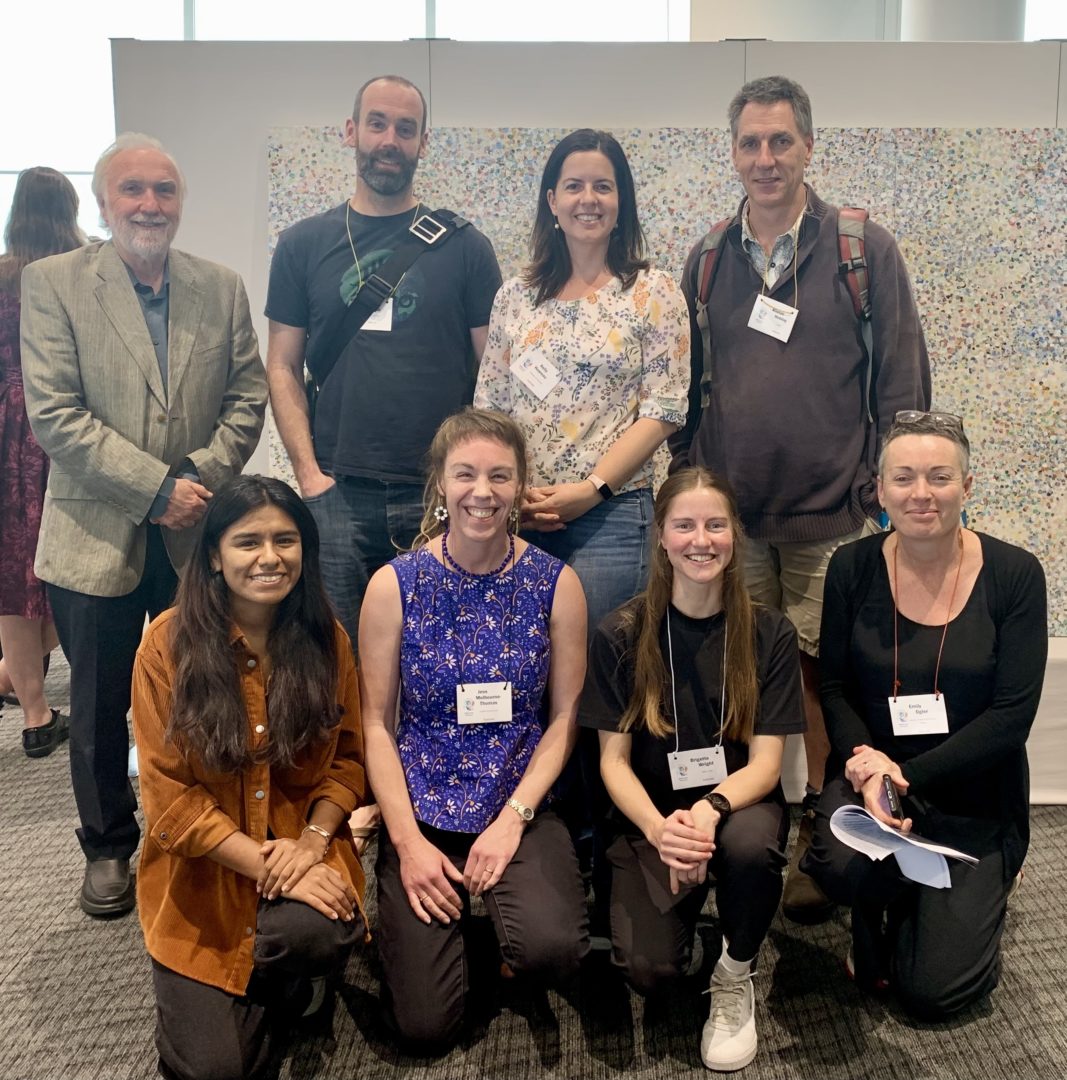
Photo caption: CMS members from Hobart at MSEAS 2024 in Yokohama. Back (L-R) Stewart Frusher, Rowan Trebilco, Kelly Hoareau, Alistair Hobday, Front (L-R) Rosa Maria Canedo Apolaya, Jess Melbourne-Thomas, Brigette Wright, Emily Ogier
Congratulations to CMS Director Prof Gretta Pecl on being recognised in the King’s Birthday 2024 Honours List!
The Order of Australia recognises Australians who have demonstrated outstanding service of exceptional achievements.
Gretta has been appointed as a Member of the Order of Australia (AM) for her significant service to science, particularly ecological research, and to tertiary education.
This is a wonderful achievement, and recognition of someone truly dedicated to her work in climate and marine science. Well done and congratulations!
See all the King’s Birthday 2024 Honours List here: https://www.gg.gov.au/kings-birthday-2024-honours-list
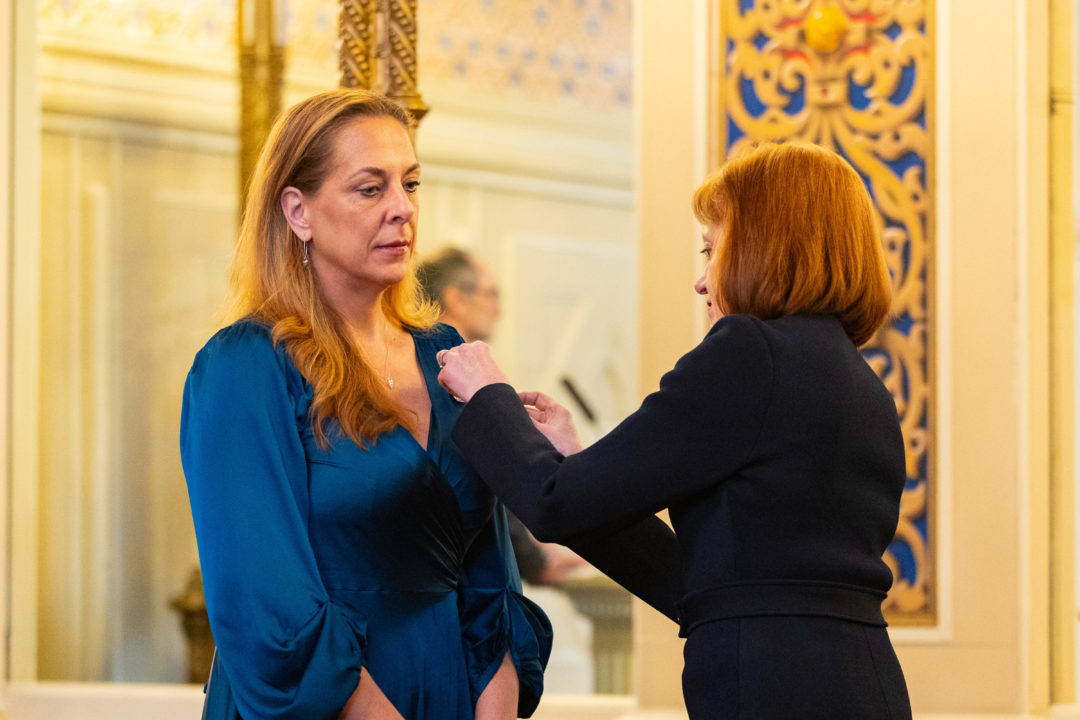
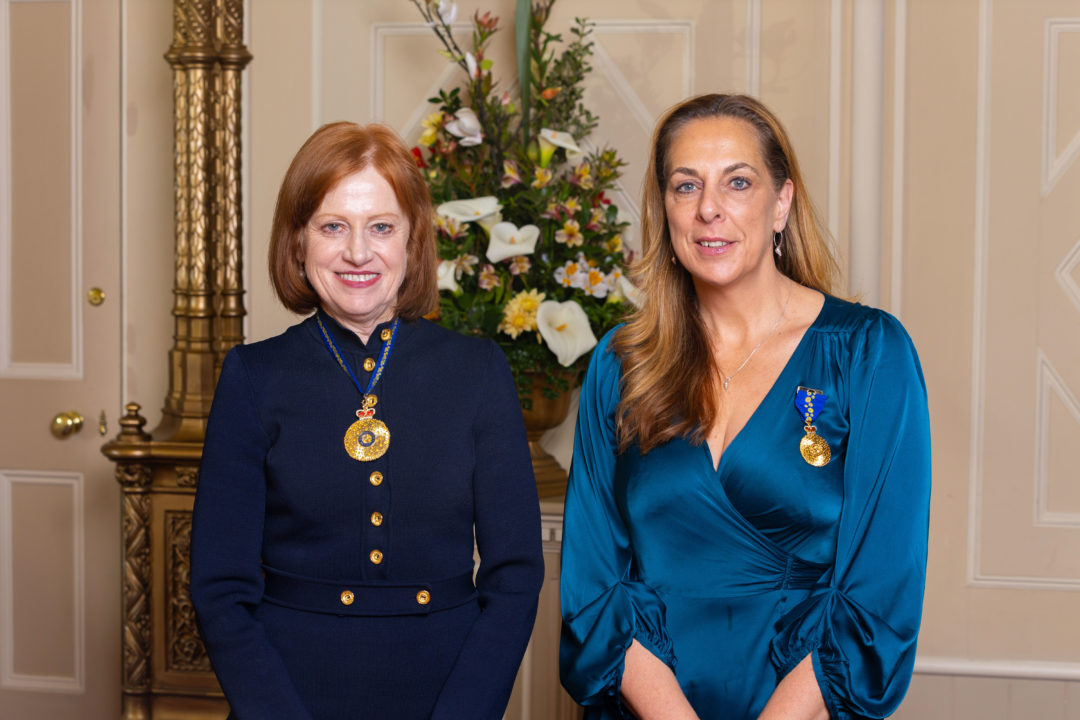
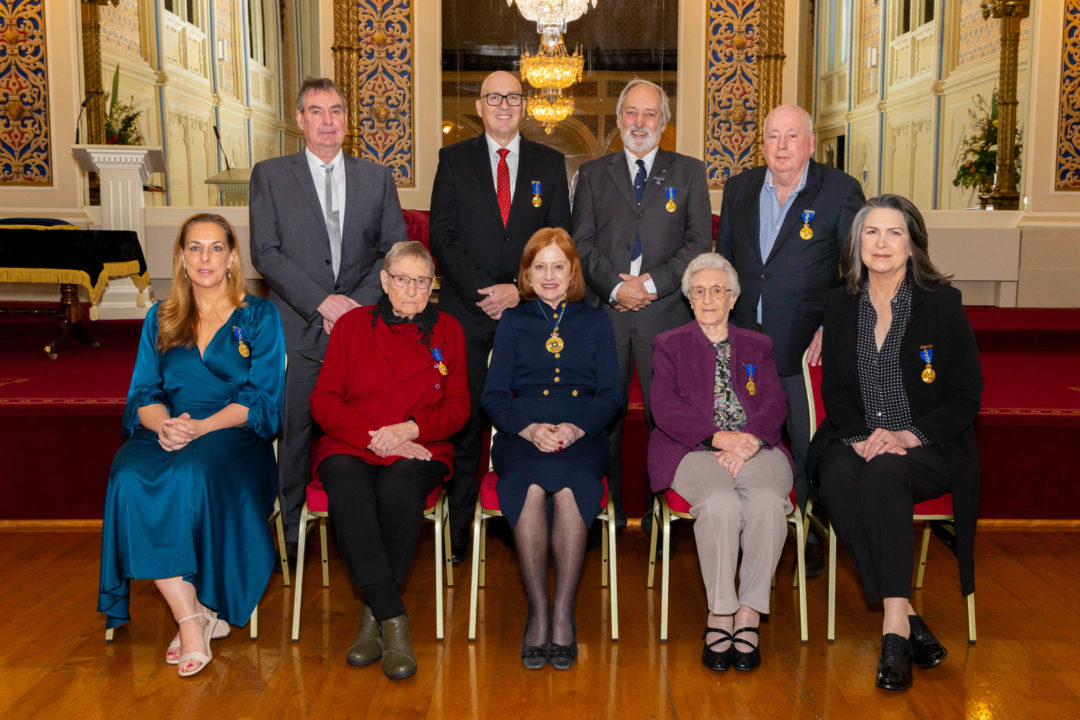
Congratulations to CMS student Olivia Dove, who was the winner of the Heather & Christopher Chong Community Service & Volunteering Award at the Tasmania Young Achiever Awards!
Olly Dove is a dedicated advocate for science communication in lutruwita/Tasmania, having volunteered across four years in fostering engagement and celebration of STEMM professionals and students. As host and co-manager of That’s What I Call Science and co-founder of not-for-profit, STEMM Communicators Australia Ltd, Olly spends her free time working hard to produce episodes, with the show now having passed 225 episodes. In 2023, the team excitingly received national recognition with a prestigious Eureka Prize. Alongside the show, Olly also volunteers at other science events, performing and presenting for school groups and the public.
See all award recipients here: https://www.awardsaustralia.com/young-achiever-awards/tas/current-winners
CMS member Dr Aysha Fleming co-authored on a recent publication for The Conversation We’re helping farmers access future climate projections as easily as checking the weather
Brief extract:
"How often do you check your local weather forecast? How about your local climate projections for 2050? For many farmers, the answer to the first question is all the time. But the answer to the second is almost certainly less than that, even though this information is crucial for understanding climate-related risks and opportunities on their patch.
We know climate change could slash Australian farm profits by as much as 32% if agriculture continues as usual. Fortunately, farmers are very good at adapting to other challenges. Developing a better understanding of how the climate will change over the coming decades will help farmers prepare and adapt.
The decision-making process will vary depending on the location and the nature of the business, but it will become increasingly important to engage and respond to climate-related risks. These may include drought, flood, fire, extreme heat or greater rainfall variability. The changing climate can also present opportunities, such as being able to branch out into growing crops or varieties not previously suited to that area.
We wanted to present this information to farmers in a more engaging and meaningful way. So we designed a free tool called My Climate View."